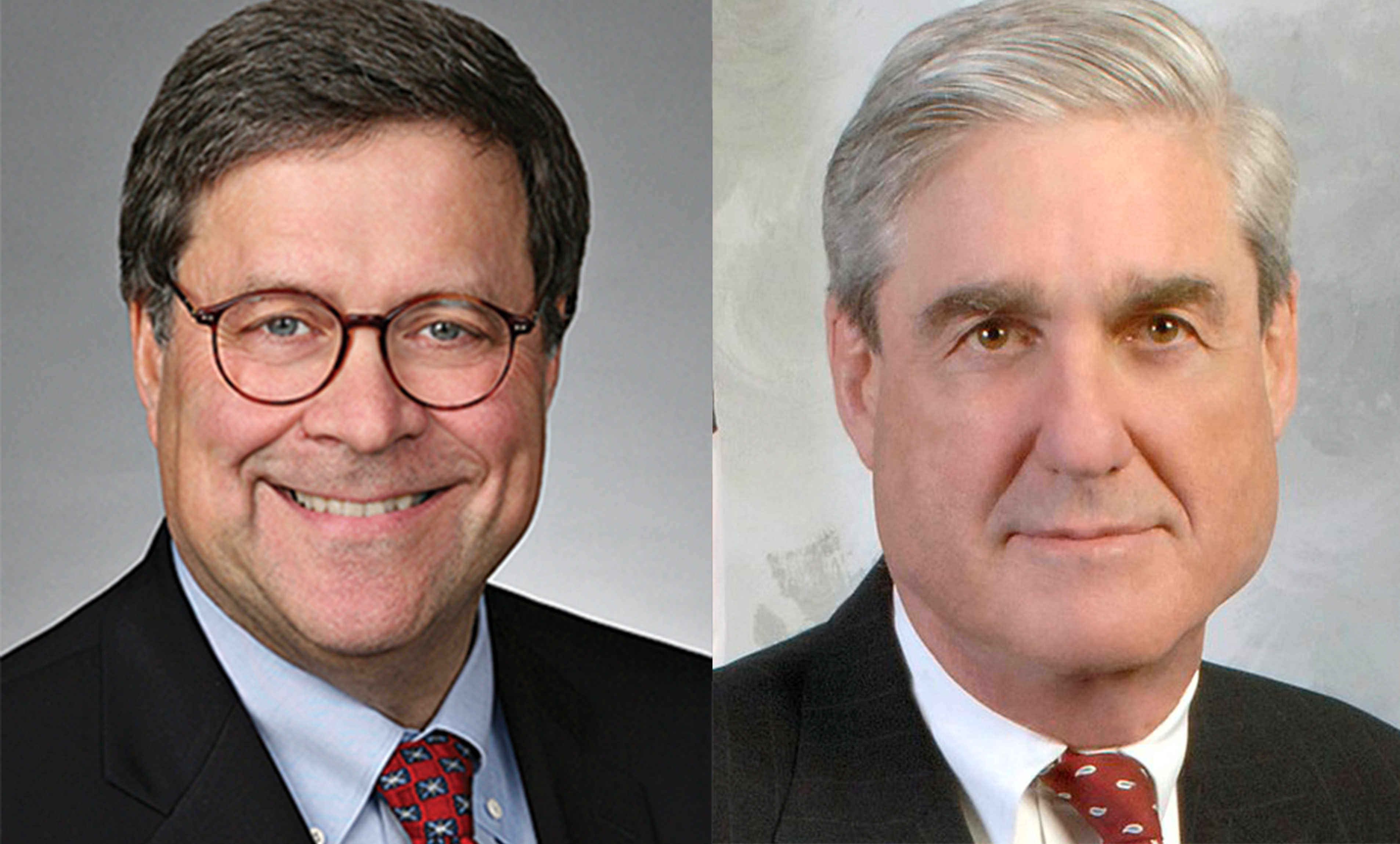Attorney general nominee Barr says he would refuse order to fire Mueller absent good cause

Attorney general nominee William Barr and special counsel Robert Mueller.
Updated: Attorney general nominee William Barr said during his confirmation hearing on Tuesday that he would refuse an order by President Donald Trump to fire special counsel Robert Mueller without good cause. But in the wake of his testimony, Democratic lawmakers are making it clear that they also want a commitment to make Mueller's final report public.
Barr said he would remain independent of political pressure if confirmed as attorney general, report the Washington Post and the New York Times. Live updates from those publications, along with Bloomberg, are here, here and here.
“I am not going to do anything that I think is wrong, and I will not be bullied into doing anything I think is wrong,” Barr said.
Barr did say, however, that he wouldn’t give up the power to stop Mueller from taking certain actions if they are unwarranted. On the other hand, he said he would not stop Mueller from seeking testimony from Trump under a subpoena if it is justified and didn’t violate policies.
Barr said in early testimony that he didn’t think the Mueller investigation was a “witch hunt.” But in later testimony, Barr said the president’s “witch hunt” claim was understandable because that is the reaction anyone would have when falsely accused.
“The president is the one that has denied there is any collusion and has been steadfast in that,” Barr said, adding that presumably he knows the facts.
In his written testimony released on Monday, Barr said he would allow Mueller to complete his work, and he would not allow partisan politics to interfere with any investigation, including Mueller’s. He also said it was important for the public and Congress to be informed of Mueller’s work, and his goal was to provide as much transparency in a way consistent with the law.
In his testimony on Tuesday, Barr said he thought he would not be allowed to release a summary report prepared by Mueller on decisions to prosecute or not prosecute. Barr said he would write his own report to Congress, and his goal would be to provide as much information as possible under grand jury secrecy rules. Barr also said he would not let the White House edit or change the report.
Barr also said he would seek ethics advice on whether to recuse himself from the special counsel probe but said he retains the right to make the recusal decision. Some Democrats have suggested Barr should recuse himself because he has criticized some aspects of the investigation.
Barr said he agreed with the decision to recuse by former Attorney General Jeff Sessions.
In an exchange with Senate Judiciary Committee Chairman Lindsey Graham, Barr was asked about a New York Times article reporting that the FBI had at one time opened a counterintelligence investigation into whether Trump was working with the Russians.
Graham asked whether Barr had ever heard of such a thing—Barr had not—and asked Barr to pledge to look into the who ordered the probe. Graham obtained Barr’s assurance, according to the New York Times.
In the wake of Barr’s testimony, the Democratic chairman of the House Judiciary Committee is threatening to subpoena Mueller’s final report.
U.S. Rep. Jerry Nadler told CNN Wednesday that his panel would subpoena the report or get Mueller to testify to get the information before the public. The ranking Democrat on the Senate Judiciary Committee, Dianne Feinstein, also said the report should be made public, and she wouldn’t vote to confirm Barr unless he committed to do so, according to the Washington Post.
Mueller was appointed under special counsel regulations that don’t require him to release the final special counsel report to the public or Congress, according to the New York Times and op-eds published by the Washington Post and the Hill.
The regulations differ from the former independent counsel statute that was allowed to expire in 1999. Independent counsel Kenneth Starr’s report on his Whitewater and Monica Lewinsky investigation was conducted under the statute, which required a report to Congress. The regulations that replaced the law require an independent counsel to give a confidential report to the attorney general explaining his decisions to prosecute or not, the New York Times explains.
At the end of a special counsel investigation, the attorney general must tell Congress about any decision he made to overrule a proposed action by the special counsel, according to the Post op-ed by George Washington University Law School professor Randall Eliason. The attorney general also may decide that public release of his own report to Congress is in the public interest.
It’s possible the Mueller report will find its way to the public after a congressional subpoena or court approval to release grand jury information it contains, Eliason said, or that a heavily redacted version could be released.
“But regardless, whatever is released may prove to be unsatisfying,” Eliason wrote. “There’s a much broader universe of potential misconduct that may be important for the public to know but does not rise to the level of a criminal offense. Mueller has a narrow mandate and need explain only his decisions to bring or not bring specific criminal charges. There’s no guarantee that whatever report Mueller does generate will address the full range of criminal and noncriminal misconduct in Starr-like detail.”
Supreme Court litigator Neal Katyal, a former Justice Department lawyer who helped draft the rules, suggested another scenario in a series of tweets and a New York Times interview. If Mueller was worried about secrecy surrounding Trump’s actions, he could tell the attorney general he will indict Trump. Then, if the attorney general overrules the decision, his report to Congress would have to discuss it, Katyal said.
Updated Jan. 17 at 6:05 p.m. to add reactions to Barr’s testimony.



